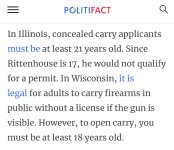Even the judge said it wasnt clear and he wasnt sure-
Schroeder said he had been "wrestling" with the statute for a while, calling it unclear.
"I'd hate to count the hours that I’ve put into it, and I’m still trying to figure out what it says, what is prohibited," he said Friday. "How are ordinary people supposed to know what’s against the law?"
US law is based on English common law and under such law things are lawful unless they are not. There is no middle ground. If the states law is incompetently written such that the letter of the law permits something that was not the intention of the lawmakers than that something is (perfectly) legal....
...as has been pointed out to you there is no grey area.
Specific acts in specific circumstances are either (perfectly) legal or illegal.
The English law tradition is rather different to the law systems that dominate on the continent where they do take a more "you can only do what the law tells you approach" rather than a "everything which is not forbidden is allowed" approach. You can see the application of this when Hancock suggested we could follow continental style laws (we didnt at least in part because of the issues it would cause overturning centuries of laws.
In March 2021 in response to the Coronavirus disease 2019 the Health Secretary Matt Hancock reportedly advised the Prime Minister Boris Johnson in the following terms: 'We’ve got to tell people that they can't do anything unless it is explicitly allowed by law. This advice has been described a 'radical suggestion', and Hancock himself reportedly described it as Napoleonic, "flipping" British tradition, because in Lockdown people would be forbidden from doing anything unless the legislation said, in terms, that they could.'




